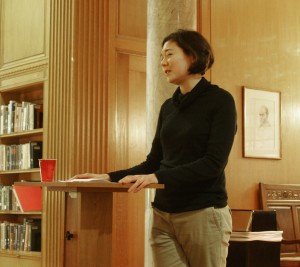
Drue Sokol, Photo Editor
On Tuesday, Feb. 14 English professor Stephanie Li delivered a talk exploring racial language in American politics in honor of Black History Month. The event was co-sponsored by the Office of Minority Student Affairs, the College Diversity Roundtable and student multicultural organization Shadowing the History and Diverse Environments of Students.
Li’s talk stemmed from her newly published book, titled “Signifying without Specifying: Racial Discourse in the Age of Obama.” Li became interested in the topic during President Barack Obama’s 2008 presidential campaign. After reading Obama’s memoir,
“Dreams From My Father,” Li observed Obama’s use of racial language and became intrigued by the overlap between language and politics.
Li’s talk began by highlighting the fact that Obama’s rhetoric is quite similar to author Toni Morrison’s literary style. In one of Morrison’s acclaimed works, “Paradise,” she creates racially unidentifiable characters, which help her employ “race specific, race free language,” which Li defines as “language that doesn’t refer to race directly, but still has racial resonance.”
Li argues that Obama also employs this technique. In one of his speeches Obama states, “We’re the ones we’ve been waiting for.”
This line is derived from a poem that Jean Jordan wrote as a call to African-American women, but that is now emblematic of the African American literary tradition.
Obama alters its meaning from its original context but still uses the statement as a call for unity to the African American people, Li believes.
Obama has also stated that “we’ve been bamboozled, we’ve been hoodwinked.” This draws directly from a Malcolm X speech, a figure who has come to symbolize the African American people’s pride and vigorous fight for equality, according to Li.
Obama subtly connects with members of his race who understand the references without alienating Caucasian listeners in the process, Li said.
She highlighted an implication of this method — instead of defining race biologically, this rhetoric mechanism defines race culturally, by how people read language and society.
Li argues that these and other linguistic styles allow Obama to speak to multiple races simultaneously, and ultimately maintain a “post-racial, transcendent” image.
Following her lecture, Li facilitated a discussion in which audience members could further explore their perception of her findings, and attendees shared many diverse views and ideas.
Senior Alex Armlovich, who attended the lecture, said that Li was “an articulate and engaging speaker.”
Senior Tejas Pathak agreed, and, reflecting on the talk, stated that “there seems to be different ideas out there about what it means to be an American culturally and what it means to think like an American, but some people in the political arena are more allowed to question that and assert what it is.”
The political philosophy that Pathak discusses is an area rather remote from Li’s background in English literature, yet the unusual intersection of the two fields is what stimulates Li most about her research. She says that what she loves about her work is that “ideas that I see in literature have direct applications to the political landscape.”
She is not alone in valuing this overlap; Pathak also reflected on the importance of her message.
“It was an analysis that few people are doing, and we would all benefit more as a country if more people looked into these subtexts to better understand where we’re going as a people,” he said.
Fagan is a member of the class of 2014.

